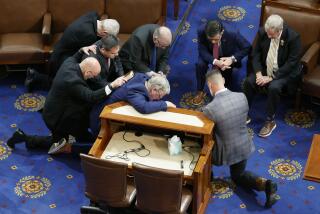Religion and Public Debate
- Share via
* I must express my dismay regarding President Clinton’s recent remarks reported in “Clinton Voices Concern U.S. May Be Too Secular” (Aug. 31).
The untamed zealotry of those who believe “religion” is their mandate to enforce their fears, bigotries, insecurities, and hatreds on the rest of us needs no further encouragement. Witness the recent murder of one physician and the wounding of another by members of the “pro-life” movement, and the compassionate “I don’t believe in killing but the doctors had it coming” reaction of so many on the sidelines.
Surely it is the President’s responsibility to recognize dangers to our constitutional freedoms and draw a line no fanatic dare cross. He instead seems to feel it is better publicity to placate an audience of clerics than defend his oath.
Religion can shape public debate in favor of greater freedom only in a society or subculture where freedom doesn’t yet exist (e.g., the former Soviet Union and its satellite states). Yet even the example given by Clinton of religion’s role in the civil rights movement shows incredible tunnel vision. While the black churches were filled with sermons of deliverance, the churches of the white segregationists were filled with their own gospel.
Everywhere religion is allowed to take the reins it must, by its very nature, establish “the way” and “the only way” one can be allowed to live. Witness the “revolution” in Iran that deposed a “secular” despot in favor of a “religious” regime that issues a worldwide death warrant against the author of a book.
KEN BURKETT
Westwood
* I certainly agree with President Clinton when he says that people of faith in this country ought to be able to say that religion shapes their approach to public debate. I speak not as a “right-winger” but as a liberal Democrat. As an active member of a mainline church I am constantly reminded that Christianity is a way of life, not just a series of Sunday platitudes. The Christian stands for love, not hate; for respecting the dignity of every living person including homosexuals and non-Christians; for not putting down those with whom we disagree.
Our forefathers who urged the separation of church and state did not expect us to live and work in a moral vacuum. Why shouldn’t we acknowledge the source of our motivation to work for a better world?
DOROTHY KILIAN
Pasadena
* I am pleased to find the President speaking out in favor of the spirit of humility and toleration, which are great fruits of the American religious settlement. I fear that the headline, that America may be “too secular,” may be misleading; to some readers it will instead signify that America should become more religious. Secular simply means “of this age.” Our largely religious people have a secular government, that is, concerned with the affairs of this world. We deal with the affairs of the religious world privately, as it is proper under our separation of church and state.
LARRY A. TAYLOR
Whittier
More to Read
Get the L.A. Times Politics newsletter
Deeply reported insights into legislation, politics and policy from Sacramento, Washington and beyond. In your inbox twice per week.
You may occasionally receive promotional content from the Los Angeles Times.










